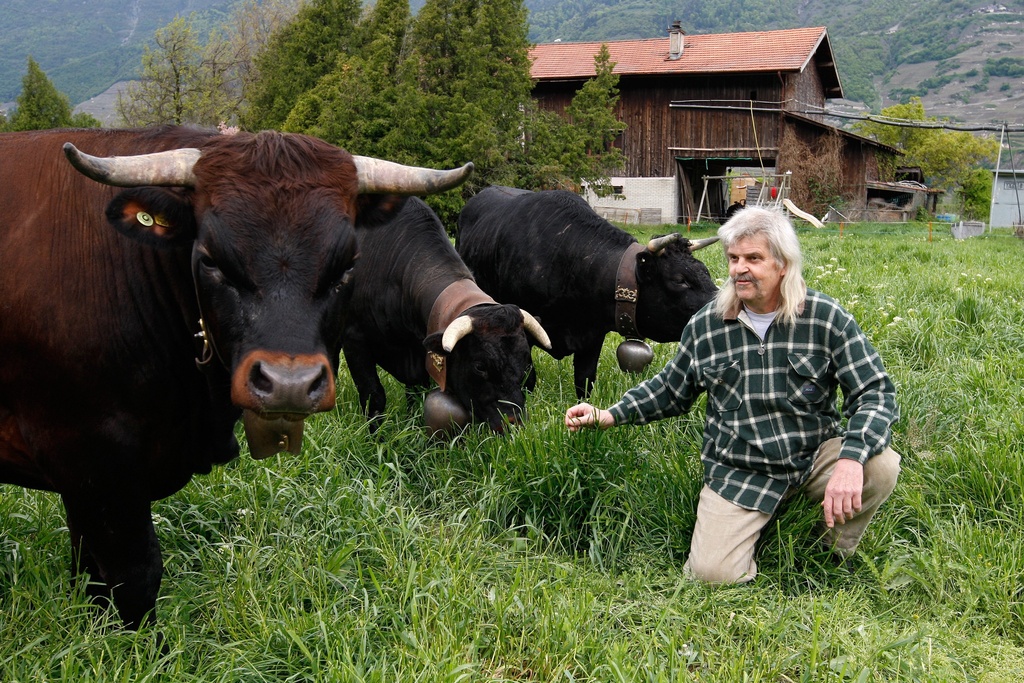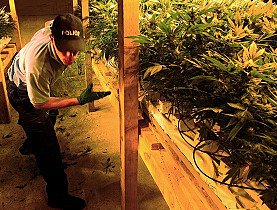Cannabis cultivator confounds the authorities

A man who has been on a hunger strike since his imprisonment for growing and trading in cannabis continues to confuse the authorities about how they should react.
Bernard Rappaz is now in Bern’s Insel hospital and doctors have been told by Esther Waeber-Kalbermatten, a member of the Valais government who is responsible for the dossier, to force-feed him to keep him alive.
She made the decision after consultation with the Swiss Federal Court in Lausanne, which is to consider an appeal by Rappaz against his sentence.
His lawyer, Aba Neeman, said on Monday he would contest the decision at the Valais cantonal court. Neeman claimed Waeber-Kalbermatten had acted beyond directives of the Federal Court – the highest in Switzerland – and the European Human Rights Court.
Neeman said he did not know if his client had been force-fed and the hospital in Bern gave no details, citing medical confidentiality.
A friend of Rappaz, Boris Ryser, later told the Swiss News Agency that he had been in telephone contact with Rappaz, who told him that he had not been forcibly fed yet. Rappaz had also signed documents with instructions that he wanted to continue his hunger strike.
Rappaz, who has been jailed on several occasions for growing cannabis, told the Tages-Anzeiger newspaper that he considered force-feeding a violation of human rights. “That would only prolong the agony. You simply die later,” he said.
After more than 50 days into the hunger strike, Rappaz told the newspaper he felt like a flame that was slowly burning out. He said he was not afraid of dying and repeated that his hunger strike was aimed at legalising cannabis.
Rappaz was transferred on July 12 to the Bern hospital, where doctors will reportedly force-feed him if he falls into a coma. Geneva’s University hospital had earlier refused such treatment.
“Unjust and colossal”
The cannabis grower has said the five years and eight months prison sentence he was handed was an “unjust and colossal punishment”, adding that “up to now I’ve never stopped a hunger strike until I was free”.
Waeber-Kalbermatten said statements made by Rappaz were paradoxical. “He has signed documents saying that he should be allowed to die but he also writes everywhere that he wants to live. His wishes are not at all clear.”
In an interview with a Sunday newspaper, Waeber-Kalbermatten outlined just how complex the case was. Standard procedures had been carried out by her department but she said that perhaps in the future “in such an extraordinary case, the whole [Valais] government should be involved”.
She also said she would contact Swiss Justice Minister Eveline Widmer-Schlumpf about a revision of the penal code.
“In the consultation procedure on the revision of the penal code, it is anticipated that electronic monitoring of prisoners with a bracelet will be increased. I want to know when it will be possible to do this.”
“Let him die”
A member of Switzerland’s National Advisory Commission on Biomedical Ethics told swissinfo.ch that canton Valais and doctors should allow Rappaz to die.
Ruth Baumann-Hölzle argued that every medical or custodial treatment was nowadays considered bodily harm, so if Rappaz wanted to continue his hunger strike even if it led to his death, this had to be respected.
However, she said that the opinion that a patient could do whatever he wanted was wrong.
“The distinctive feature of the situation is that he is in custody and therefore the state has an increased welfare duty.”
“But Rappaz has given instructions that in this specific situation he does not want to be fed by force. Because he anticipated this, one should respect his instructions and he should not be force-fed, even if he no longer has the capacity to act and judge.”
Baumann-Hölzle added that the state had to take measures so that it could not be blackmailed by hunger strikers in general.
Cannabis pioneer
In an internet blog Rappaz describes himself as a pioneer. “Cannabis is a part of our past and our heritage.” He claims no one has died from cannabis, whereas alcohol and tobacco are responsible for the deaths of 13,000 people every year in Switzerland.
He also describes the potential of cannabis as “fantastic” and cites, among other things, its therapeutic, aromatic, textile, paper and energy uses.
Rappaz admits that his activities as an independent politician, his openness with the media and his 17 appeals at the Federal Court have “deeply frustrated Valais justice [authorities]”.
“And so I have become public enemy number one, the man to destroy at all costs.”
He added that going on hunger strike was the only “non-violent weapon” he had when he was behind bars.
Robert Brookes, swissinfo.ch (With input from Renat Künzi)
Rappaz has campaigned for the legalisation of growing hemp and its consumption in Switzerland.
Valais police in 2001 went to Rappaz and confiscated 51 tons of hemp with a value of about SFr40 million ($38 million).
He was sentenced in canton Valais in November 2008 to five years and eight months imprisonment after being convicted of serious violation of the narcotics law.
Rappaz began his punishment in March this year but his sentence was temporarily suspended on medical grounds after he went on hunger strike.
He was imprisoned two weeks later and began another hunger strike. Rappaz says he is willing to continue his strike until he dies.
He was transferred forcibly from a Geneva hospital to Bern’s Insel hospital on July 12.
The cantonal court of Valais has rejected an appeal against his sentence. An appeal to the Federal Court is still pending.
The theologian has been a member of the National Advisory Commission on Biomedical Ethics since its creation in 2001.
She has been head of Dialog Ethik, an interdisciplinary institute for ethics in health care based in Zurich, since 1999.
Its aim is to contribute to a health care system based on the values of respect, responsibility and justice.

In compliance with the JTI standards
More: SWI swissinfo.ch certified by the Journalism Trust Initiative




You can find an overview of ongoing debates with our journalists here. Please join us!
If you want to start a conversation about a topic raised in this article or want to report factual errors, email us at english@swissinfo.ch.